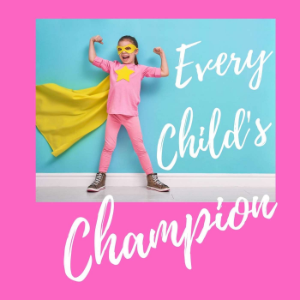
Every Child's Champion
Education Podcasts
For Early Childhood Teachers and the Instructional Leaders who support them. This podcast gives you a thoughtful, informative look at the most important issues and topics in the ECE field. Hosted by a 30+ year veteran with wide ranging experience in Head Start, Child Care, and public schools, Every Child's Champion brings teachers and those who care about them needed supports, encouragement, inspiration, and FUN. Each week you will be challenged to take something specific back into your workplace and put it into practice. A great place to boost your reflective practice and absorb some new info and ENERGY for the most difficult work on the planet!
Location:
United States
Genres:
Education Podcasts
Description:
For Early Childhood Teachers and the Instructional Leaders who support them. This podcast gives you a thoughtful, informative look at the most important issues and topics in the ECE field. Hosted by a 30+ year veteran with wide ranging experience in Head Start, Child Care, and public schools, Every Child's Champion brings teachers and those who care about them needed supports, encouragement, inspiration, and FUN. Each week you will be challenged to take something specific back into your workplace and put it into practice. A great place to boost your reflective practice and absorb some new info and ENERGY for the most difficult work on the planet!
Language:
English
Contact:
6305678278
Email:
sbeach.synapse@gmail.com
What does it mean to be a Pyramid Model Classroom?
Duration:00:56:13
How to Deepen Children’s Learning and Prevent Challenging Behaviors by Facilitating PLAY
Duration:00:18:01
Creating Joyful Classrooms: Enhancing Child Relationships and Educator Well-being
Duration:00:28:32
On Addressing Teacher Shortages and Behavioral Challenges in Early Childhood Education
Duration:00:36:48
Preventing and Responding to Challenging Behaviors: The Pyramid Model, with Deidre Harris
Duration:00:48:02
Keys to Building Strong Relationships with Parents of the Most At-Risk Children
Duration:00:42:18
These kids are STILL driving me crazy!
Duration:00:42:10
Parent Engagement through the Power of Touch: The Beauty and Benefits of Infant Massage
Duration:00:37:49
Mindfulness for Champions: Take Care of You!
Duration:00:17:48
Anxiety, Depression, and the Polyvagal Theory: My Story
Duration:00:45:44
A Play Therapist’s Perspective on the Impacts of Trauma on Children’s Behavior
Duration:00:36:30
Children and Trauma: A Look at Resilience in Early Childhood Development, with Allen Rosales
Duration:00:47:41
Push Past It! An interview with Dr. Angela Searcy
Duration:00:38:38
Equity and Implicit Bias, Part 1
Duration:00:28:21
018_Returning to School During Covid19: Getting off to a Great Start!
Duration:00:31:05
017_Helping Children Learn to Self Regulate
Duration:00:44:12
How to Actually Enjoy Your Job During Stressful Times
Duration:00:52:01
Think Up! Becoming a More Intentional Teacher
Duration:00:59:27
Create the Wonder! Science in the Early Childhood Classroom
Duration:00:57:20
How to Slay the ECERS-3 Math Items! Part 2
Duration:00:36:16